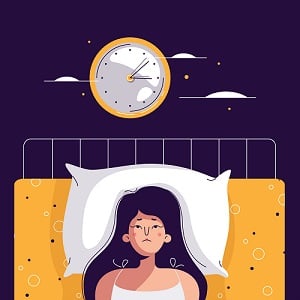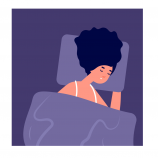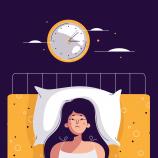Overcoming Insomnia and Making Improved Sleep a Reality
Overcoming Insomnia and Making Improved Sleep a Reality

Getting a good night’s sleep provides many benefits. It reduces stress, supports health satisfaction, and allows one to feel overall more balanced. What happens though if the bed becomes associated with repeated stress, anxiety, and constant sleepless nights? This is the life of someone struggling with chronic insomnia.
While most people have struggled with sleep at some point in their life, chronic insomnia impacts approximately 10% of the population. Chronic insomnia is contributed by predisposing factors (i.e. genetics), precipitating factors (i.e. life stressors), and perpetuating factors (i.e. irregular sleep patterns, poor sleep hygiene, worrying in bed, etc).
Endless sleepless nights can lead to an array of negative thoughts about sleeping, the bed, and one’s overall well-being. “Will I ever sleep again?” “I hate this bed.” “I’m going crazy and cannot handle it.” “This is torture.” “Here we go again…maybe there is something wrong with me.” Even worse, people with constant sleepless nights might find themselves worried that they are sick or dying.
Chronic insomnia can cause both mental health and physical health difficulties. This includes struggles with exhaustion, fatigue, irritability, and difficulty concentrating. There is the potential of increased stress, anxiety, and depression. Questions over one’s ability to manage their job, support their family, and take care of oneself comes up as a result of consistent restless nights.
Is there any hope after endless nights of poor sleep for months or years? Absolutely! Cognitive Behavioral Therapy for Insomnia (CBT-I) is considered a first line treatment for insomnia. Its impact on improved sleep is often more lasting in comparison to medication.
CBT-I is a short-term evidence-based treatment program, and should be completed with a CBT-I specialist. Treatment consists of approximately 6 to 8 weekly sessions, however it can vary based on an individual’s needs. CBT-I’s treatment program includes stimulus control, sleep restriction (to lead to improved sleep efficiency), cognitive restructuring, relaxation strategies, and improved sleep hygiene.
Effective CBT-I treatment requires a thorough assessment and client specific interventions. While this should be done in conjunction with a CBT-I specialist, below are some behaviors that I initially recommend to help with improved sleep hygiene:
- The bed should be used for sleep and sex only! Do not do other activities, such as reading, eating, or watching TV in bed. This change will help create the association of the bed as being a place for sleeping.
- Exercise regularly.
- Get some sun exposure during the day.
- Make sure the bedroom is quiet, dark, and has a comfortable bedding.
- Avoid using electronic devices an hour before bedtime.
- Get out of bed within 30 minutes if you are unable to fall asleep initially or are having difficulty falling back asleep. At this point do a non-stimulating activity (i.e. read a boring magazine; crossword puzzle) until you have slowed down and are ready to return to bed.
In my experience, CBT-I has helped positively alter the perceptions for people who have struggled with insomnia. They are more able to get a consistent good night’s sleep, and are often no longer plagued throughout the day and night about their fears of the bed. The bed has become a more welcoming place for the individual, as it is seen as a source for relaxation and sleep.


















